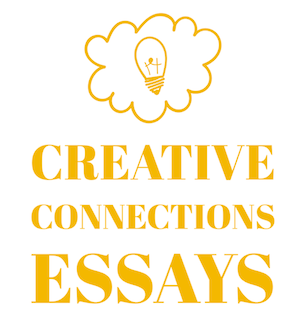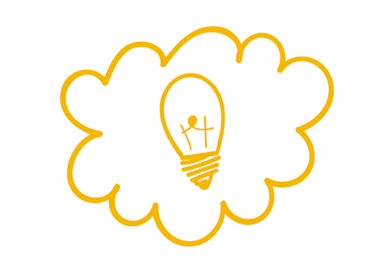Creative Connections Essays
College Essay Writing Guide
Read below to find out how to write a successful creative college essay!
Welcome to Creative Connections Essays “How To” Guide, though I’m hesitant to use those words. I believe that writing a successful personal essay (as my teacher first taught me) involves a different approach.
The term “essay” comes from the French “essayer,” which means “to try” or “to attempt” (If you knew that— 10 points to Gryffindor!).
I’d like you to think about this process as a “to try” guide. Both as a document that provides strategies to try, and, also, as a larger metaphor for the college essay process, which may feel heavy right now due to COVID-19. We’re all just trying our best—at school, at home, with family, and friends. Adding college applications to the mix is a lot, I know! But if you start now, you’ll have time to learn and think and process. And that’s what writing is all about—for this essay and beyond.
So, back to this essay. Your task, in 650 words or less, is to try to arrive at an answer to one of the Common App essay questions, to try to explain how you feel about something you’re passionate about, to try to express what is important to you, to try to capture a person or a moment that has shaped you, to try to describe what is meaningful in your life, etc.
All of these questions circle the same underlying idea: what matters to you— and why?
If I asked you this outright, answering may feel overwhelming. A lot of things probably matter to you! Your family and friends, your dog, your favorite TV show. Maybe it’s the view from your window. Or maybe it’s a cause, small or big—people dog-earing library books or the environment.
Picking just one thing that matters seems challenging, especially when you’re not just picking one… you’re picking the right one. The one that appeals to college admissions officers.
And then you have to consider: why? Why do you love that band? Why is the moment you went hiking with your best friend your most important memory? Why is that your favorite sweater?
“I don’t know, it just is.” (Usually my answer.) Or, “I like it.” Or, “it’s soft” (in case of the sweater).
But trying to put words to those feelings to try to explain “why” is… really hard. You have to think about it. And thinking takes time. Especially if you’re considering something you haven’t really considered before.
No matter what you ultimately choose to write about, if I were to summarize the main point of a college essay, it’s the following: you are trying to show WHO you are through HOW you think.
It’s kind of like in Math class where you have to show your work–your essay is trying to make visible the jumps, associations, reflections of your thoughts as you process your experience and worldview. And in doing so, you are showing how you think—how you make meaning (the “why”) of what matters to you.
If you follow this advice, any subject has the potential to be a great college essay (one of my favorites was about how a student loved warm, bland foods).
Sounds easy, right? 🤦♀️
Remember, I’m freeing you by saying the first thing you have to do to succeed is to try. If you try to do this to the best of your ability, it shouldn’t be easy— but you will engage in the kind of writing that makes for a successful essay. All you have to do is try.
So, ready to try?
Try Tip #1: Think with Purpose
Consider: what’s an activity you do that matters to you? Maybe you build robots. Collect cookbooks. Maybe you love debate or play tennis.
Consider also that (at the time I’m writing this), you’re sheltering in place. How has that affected your activities? Or maybe brought about new ones?
If not an activity, maybe there’s been an experience that’s given you a different outlook? Or, maybe it was something a friend said to you? A parent? A teacher? Something you read or saw on TV? A song you listened to?
Don’t go towards analysis yet. Just let the ideas start to percolate.
If you think best by doodling or drawing… grab a pencil. If ideas come to you when you move… take a walk (if it’s safe to do so). Work with what works best for you.
Try Tip #2: Top Ten List
Now, time to write. Here’s one way I love to brainstorm for unique ideas, which is inspired by BestSelf Co.
Take a blank sheet of paper and number it from 1-10. Set a timer for 10 minutes. Try to list 10 answers. Maybe the first is more conventional—your extracurricular that you’d write on your application, about how you’re an all-star debater. But by the time you get to number 6, 7, 8 or 9, you really have to get creative (how you organize your spice rack at home, for example. Not alphabetically but by usage. Your style of Animal Crossing game-play. That time you read that the heart of a shrimp is located in its head).
Sometimes our best and most original ideas come from pushing ourselves to keep going, and, trust me, again, anything can be an essay! (One all-star student brainstorm from this effort was about eBay shopping for Victorian horror dolls on the Internet 🧟♀️).
Try Tip #3: Find Connections & Make Meaning
Looking at your list, do any of your answers surprise you or stand out?
Pick one brainstorm to consider for the next part of the exercise, the “why.” (The surprising answer is my vote 😉.)
Answering “why” this idea, activity, experience, (etc.) matters to you is the most challenging part of this essay. It’s the place where you can draw connections from what you’re passionate about to who you are as a member of your community, a student, or a human being as a whole.
I had one student who wrote their essay about how their Clash of Clans game-play was emblematic of their interest in pursuing financial modeling. Another about how viewing art in museums was a way to process difficult emotions they didn’t allow themselves to feel IRL.
So, I want you to try to answer the following: How does your answer show how you think? What does it say about how you process your world? Why does it matter?
If you’re nervous because you don’t know yet… you’re on the right track.
I don’t want you to be able to answer this question yet completely because the answer to this question is your essay.
(If you know the answer before you start, then are you really trying?)
So, jot down some of the first impressions that come to mind to help you try to answer this question—similar experiences, patterns of behavior, something you may have read that resonates, more questions you may have about the experience, how it makes you feel to try to make meaning. What do you need to try to explain your feelings and thoughts to answer these questions?
Maybe in order to explain why you have a particular system you’ve developed to do laundry is because you come from a big family, and it’s your chore every week. Your process makes sure you spend the least amount of time on the task, but also that no one gets the wrong sibling's socks.
How else might this be emblematic of how you problem-solve? Are you the one people come to when they need something organized? Is math your best subject in school? Or, in thinking about laundry, did you realize that you also apply this method of thinking to running your school’s biggest bake sale? How you plan your study schedule? Or maybe it’s the opposite—at home, you're super organized, but not at school because there’s someone else to take on the responsibility… how does that make you feel? What other experiences does it remind you of? How is that meaningful?
There are no wrong answers here because YOU are the only one who can provide the answer—one that comes from when you try to understand what is important to you and capture these realizations on the page.
Thanks for reading this TRY TO GUIDE! It tries the right direction. Hope it was helpful. 😊
If you’d like more guidance, please visit Creative Connections Essays or email me!
I look forward to connecting,
Anabel
Anabel Graff
Creative Connections Essays



